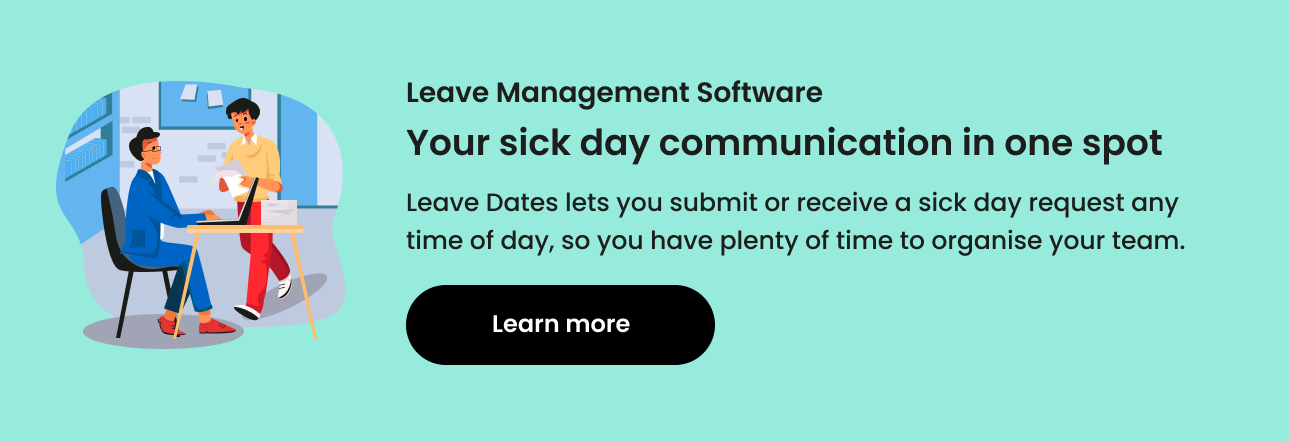Taking a sick day can sometimes feel awkward, even though it is necessary when you're not feeling your best. You're in good company if you have ever felt like you could push through and not 'put anybody out'. In most cases, a stitch in time saves nine, and whether you're coming down with a cold, have a looming migraine, or need a wellbeing day to prevent burnout, your sick days are there to be used when you need them most.
When you notify your manager that you need a day off, there is a right and wrong way to do it, depending on your circumstances. If god forbid, you have a serious emergency, all that can be expected is that you do your best to notify your workplace. For most cases, following these steps will ensure that you can have a peaceful day (or more) to recover and know that your team will be able to balance their workload.
Here's your step-by-step guide to do it right.
How to 'call in sick' for work professionally
Know your workplace's sick leave policy
This is handy to be on top of before a sick day event. When you were onboarded into your role, you likely received a document with company policies, including those regarding leave. Once upon a time, this may have been a printed and bound book that collects dust in the attic, but most modern companies now keep them on a portal or cloud-based software so it is accessible anytime. Get familiar with these policies and see if you need to contact someone to apply for leave or download your employer's leave management system.
The sick leave policy should outline how you apply for leave, who will approve it, any documentation you need to submit, relevant timelines and any special policies.
Notify your employer
The most important step is to let your manager know as soon as possible that you need the day off. This gives them the best chance to shuffle schedules successfully, replace you for the time you're off with a casual staff member, or reorganise the workload.
Your company policy will outline the preferred method of contact, but it is usually most beneficial to communicate in writing via your leave management app, email, text, or a communications program like Slack.

Be honest and keep your manager updated.
It's important to know that being honest doesn't require you to go into detail about your illness. Feeling uncomfortable giving details about your mental or physical health is perfectly reasonable. By honest, we mean that informing them you are feeling unwell and need a day to rest and recover is sufficient.
Providing documentation
In many cases, if you take a single day off, you won't be required to provide any supporting documentation. However, suppose you are taking several days off, or your sick day falls immediately after a weekend, bank holiday, or major public event. In that case, it may be reasonable for your employer to ask for a doctor's note.
Did you know? In 2024, after the Euros final, it was predicted that up to two million people in the UK could have called in sick for work. While Brits were campaigning for the following Monday to be a bank holiday if England secured victory, supermarket chain Lidl had its own solution. Knowing there was a slim chance of a bank holiday being declared, Lidl opened their doors an hour late on the morning after the Euros final and gave around 30,000 staff a well-deserved sleep-in.
Keep your manager updated.
Sometimes, recovery doesn't quite go according to plan, and you need some extra time. If you foresee this as a possibility in the beginning, let your manager know that you will update them later in the day or tomorrow on how you're feeling and if you need more time off.
Try to find a cover for your shift.
If you can, help your manager find someone to cover your shift. They will appreciate your consideration.
Whether your manager gets another staff member in or redistributes the work to the already scheduled team, be sure to mention if there are any urgent tasks and how your replacement can access documents to get them sorted out.
Catch up with your team when you return to work.
Once you're better and back to work, reinforce your appreciation by thanking each person who helped keep things moving in your absence. Find out if there was anything you missed and if you can help anybody else catch up on their own tasks.
Key takeaways
Taking time off when sick is not a luxury; it is essential for your health and well-being. Although your absence may not always be convenient for your employer or coworkers, you can minimise the impact of your time away by handling the situation professionally. Familiarising yourself with your company’s policy, notifying your employer promptly, and maintaining open communication can help you recover without added stress, which could prolong your illness. Once you’re back to your usual self, you can express your gratitude to your team members by assisting them in catching up on any tasks they may have fallen behind on.
Remember - your health is your biggest priority for a balanced life in and outside of work.




